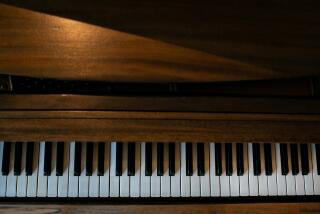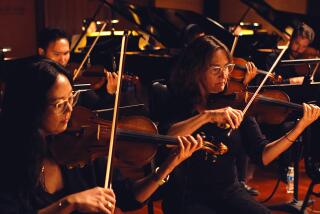Piano Software Hits the Right Keys : Technology: Computer program can show children how to play the piano, but teachers say this kind of instruction may need a lot of fine tuning.
COSTA MESA — Jessica Shapiro, with nary a piano lesson in her 14 years, is arched over the television/piano contraption in the FAO Schwarz toy store at South Coast Plaza deftly practicing a finger exercise.
“It’s neat,” says the Northridge teen-ager. “It’s a lot better than having a teacher because kids like watching TV.”
For some of us, taking piano lessons is the stuff of childhood memories. Children growing up in the 1990s, though, may have these memories in a slightly different form--courtesy of increasingly complex video technology that already is teaching them to read, spell, do math, learn languages and play board games.
The latest and most advanced piece of wizardry that promises to change the course of childhood forever is the Miracle Piano Teaching System. This sophisticated software plugs into Nintendo units so children can learn to play Beethoven by following the notes on their television screens.
“Parents don’t want their kids just sitting in front of the television shooting little men,” says Linda Barber, manager of Babbage’s Software in South Coast Plaza, Costa Mesa.
Now their children can sit in front of the television and learn 200 piano lessons and 40 different musical pieces. The Miracle has an electronic keyboard with full-sized keys that play 128 instruments and effects, and a foot pedal to extend the notes like those on a piano.
“I took piano lessons for four years and I never learned how to play with two hands,” says Rachel Werner, manager of the FAO Schwarz. “With the Miracle, if you really adhere to it you can do it in six months.”
Indeed, the Miracle may threaten to replace the piano teacher, stereotypically a stern but caring taskmaster people always remember--some with affection, others with dread.
All of which does not sit well with Robert Beardsley of Costa Mesa, who has taught piano for 22 years. Computerized piano lessons, he says, are “a cop-out.”
“Music is art as well as science. You can’t teach art properly through a computer,” Beardsley says.
There are some things humans do better than computers, he says, and teaching music is one of them.
“Individual attention is so important. The fine details of playing the piano--the rhythm, the expression--how could a computer evaluate that?”
Piano instructors caution that a computer can’t identify bad habits a child might pick up during the course of the lessons.
“A computer can’t tell if a student’s hand structure is off,” says Jennifer Anderson, a piano instructor with the Orange County Piano Institute in Irvine.
She also objects to the idea of learning piano on a keyboard that makes computer-generated sounds. The rich, subtle tonality of the piano is lost to the artificial notes, she says.
So far, the computerized system has attracted a lot of interest, even at a cost of about $350, not including the $100 Nintendo Entertainment System needed to run the program.
“The response has been great. Every time we get one in it sells, and we’ve been getting one in about every two weeks,” says John Fair, manager of the Electronics Boutique at MainPlace/Santa Ana.
“When you look at the high cost of pianos and lessons,” he says, “it starts to make quite a bit of sense.”
More to Read
Sign up for Essential California
The most important California stories and recommendations in your inbox every morning.
You may occasionally receive promotional content from the Los Angeles Times.










